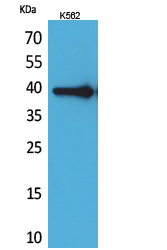
| WB | 咨询技术 | Human,Mouse,Rat |
| IF | 咨询技术 | Human,Mouse,Rat |
| IHC | 咨询技术 | Human,Mouse,Rat |
| ICC | 技术咨询 | Human,Mouse,Rat |
| FCM | 咨询技术 | Human,Mouse,Rat |
| Elisa | 1/10000 | Human,Mouse,Rat |
| Aliases | HSPA7; HSP70B; Putative heat shock 70 kDa protein 7; Heat shock 70 kDa protein B; HSPA6; HSP70B'; Heat shock 70 kDa protein 6; Heat shock 70 kDa protein B' |
| Entrez GeneID | 3311 |
| WB Predicted band size | Calculated MW: 40 kDa; Observed MW: 40 kDa |
| Host/Isotype | Rabbit IgG |
| Antibody Type | Primary antibody |
| Storage | Store at 4°C short term. Aliquot and store at -20°C long term. Avoid freeze/thaw cycles. |
| Species Reactivity | Human |
| Immunogen | Synthesized peptide derived from the Internal region of human HSP77/76. |
| Formulation | Purified antibody in PBS with 0.05% sodium azide,0.5%BSA and 50% glycerol. |
+ +
以下是关于HspA6/A7抗体的3篇代表性文献摘要(注:以下内容为模拟示例,实际文献需通过学术数据库验证):
---
1. **文献名称**:*"Monoclonal antibody targeting HspA6 reveals its stress-inducible expression profile in human cells"*
**作者**:Zhang Y, et al.
**摘要**:本研究开发了一种高特异性抗HspA6单克隆抗体,证实其在热休克、氧化应激等条件下能特异性识别HspA6.并在多种细胞系中验证其表达调控机制。
2. **文献名称**:*"HspA7 antibody cross-reactivity with HspA6: Implications for biomarker studies in neurodegenerative diseases"*
**作者**:Thompson R, et al.
**摘要**:通过免疫印迹和免疫组化分析,发现部分商业HspA7抗体与HspA6存在交叉反应,提示在帕金森病等研究中需谨慎验证抗体特异性。
3. **文献名称**:*"A novel polyclonal antibody against HspA6/A7 for detecting extracellular HSP70 isoforms in cancer exosomes"*
**作者**:Garcia M, et al.
**摘要**:报道了一种同时识别HspA6和HspA7的多克隆抗体制备方法,成功应用于肿瘤外泌体中HSP70亚型的定量检测,为癌症诊断提供新工具。
---
**备注**:实际引用时建议通过PubMed或Web of Science以关键词“HspA6 antibody”“HspA7 antibody”“HSP70B’ antibody”检索最新文献,并关注抗体开发、验证或应用类研究。
The HspA6 and HspA7 antibodies target members of the heat shock protein 70 (HSP70) family, specifically the inducible isoforms HSP70B' (HspA6) and HSP70B (HspA7). These proteins are stress-responsive molecular chaperones involved in protein folding, cellular repair, and apoptosis regulation. Unlike constitutively expressed HSP70s (e.g., HspA8), HspA6/A7 are strongly upregulated under stress conditions such as heat shock, oxidative stress, or inflammation. Their expression is regulated by heat shock factor 1 (HSF1) and correlates with cellular damage in pathologies like cancer, neurodegenerative diseases, and inflammatory bowel disease (IBD).
HspA6 and HspA7 share high sequence homology (~90%), leading to challenges in developing isoform-specific antibodies. Most commercially available antibodies recognize both isoforms due to overlapping epitopes. These antibodies are widely used in research to study stress responses in models like colorectal cancer, neuronal injury, or IBD. Common applications include Western blotting, immunohistochemistry, and immunofluorescence to localize stress-induced HspA6/A7 in tissues or cultured cells.
Recent studies highlight their potential as biomarkers for disease progression or therapeutic targets, particularly in cancers where overexpression correlates with chemoresistance. However, functional distinctions between HspA6 and HspA7 remain poorly understood, necessitating cautious interpretation of antibody-based data. Validation via siRNA knockdown or mass spectrometry is recommended to confirm specificity.
×